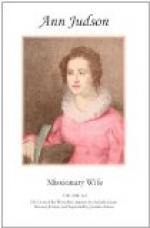But her own idea of the comparative happiness of her two lives, may be best gathered from her poetry, for it is a characteristic and charm of her verse that it is the pouring forth of her deepest feelings at the moment when they swayed her soul with strongest influence. We extract a few verses from a poem written at Rangoon, during that period of great physical suffering to which we have alluded, but of which Dr. Judson writes: “My sojourn in Rangoon, though tedious and trying in some respects, I regard as one of the greenest spots, one of the brightest oases, in the diversified wilderness of my life. If this world is so happy, what must heaven be?”
TO MY HUSBAND.
“Tis May, but no sweet
violet springs
In these strange
woods and dells;
The dear home-lily never swings
Her little pearly
bells;
But search my heart and thou
wilt see
What wealth of flowers it
owes to thee.
The robin’s voice is never
heard
From palm and banyan trees;
And strange to me each gorgeous bird,
Whose pinion fans the breeze;
But love’s white wing bends softly here,
Love’s thrilling music fills my ear.
* * * * *
The pure, the beautiful, the good,
Ne’er gather in this place;
None but the vicious and the rude,
The dark of mind and face;
But all the wealth of thy vast soul
Is pressed into my brimming bowl.
* * * * *
Here closely nestled by thy side,
Thy arm around me thrown,
I ask no more. In mirth and pride
I’ve stood—oh so alone!
Now, what is all this world to me,
Since I have found my world in thee?
Oh if we are so happy here,
Amid our toils and pains,
With thronging cares and dangers near
And marr’d by earthly stains,
How great must be the compass given
Our souls, to bear the bliss of heaven!”
As to the sacrifice of her literary taste and reputation, this is so far from the fact, that we may assert without fear of contradiction, that the world never knew her best excellence as a writer, till it was startled, as it were, by her deathless utterances, wafted by east winds from her Indian home. Her memoir of her predecessor, and her appeals for Burmah, have thrilled thousands of hearts that knew nothing of her “Alderbrook;” and her “Bird,” has, perhaps, awakened in many a mother’s heart its first deep appreciation of the holy responsibilities of maternity. The Christian world gained much, the literary world lost nothing, when Fanny Forester became a missionary.
But her harp is idle now, and its loosened strings will wait long for a hand to tune and draw from them such soul-moving cadences as we have been wont to hear. In purer air she sweeps a nobler lyre; and methinks her song may well be, “Blessed are the dead that die in the Lord; even so, saith the Spirit, for they rest from their labors, and their works do follow them.”




